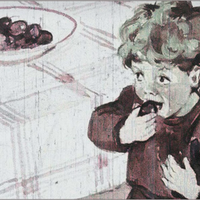КОСТОЧКА
Kern
bone fragment
عظم
BONE
BONE
HUESO
OSSE
OSSO
骨
BOT
KOŚĆ
OSSO
BONE
KEMİK
骨
Купила мать слив и хотела их дать детям после обеда.
bought|mother|a plum|and|wanted|them|give to|children|after lunch|lunch
||plommer|||||||
اشترت الأم خوخًا وأرادت أن تعطيه لأطفالها بعد الغداء.
Mutter kaufte Pflaumen und wollte sie nach dem Abendessen den Kindern geben.
I bought a mother plums and wanted to give them to children after dinner.
Une mère a acheté des prunes et veut les donner à ses enfants dans l'après-midi.
Una madre comprò delle prugne e voleva darle ai suoi figli dopo pranzo.
Они лежали на тарелке.
|lagen||Teller
|were lying||on the plate
كانوا على اللوحة.
Sie waren auf einem Teller.
They were lying on a plate.
Ils étaient posés sur une assiette.
Ваня никогда не ел слив и всё нюхал их.
||||Pflaumen|||gerochen|
Vanya|never||ate|plums||at all|smelled them|them
|||||||sniffet|
لم تأكل فانيا البرقوق أبدًا وظلت تشمها.
Wanja aß nie Pflaumen und roch sie die ganze Zeit.
Vanya never ate a sink and still sniffed them.
Vanya ne mangeait jamais de prunes et ne cessait de les renifler.
ヴァーニャはプラムを食べたことがなく、いつも匂いを嗅いでいました。
И очень они ему нравились.
|||to him|liked
وقد أحبهم حقًا.
Und er mochte sie sehr.
And he really liked them.
Et il les aimait beaucoup.
Очень хотелось съесть.
|wollte unbedingt|essen
really|really wanted|eat something
||å spise
أردت حقا أن أكله.
Ich wollte wirklich essen.
I really wanted to eat.
J'avais vraiment envie de le manger.
Он всё ходил мимо слив.
he|always|walked|past|plum
استمر في المشي بجوار البرقوق.
Er ging weiter an den Waschbecken vorbei.
He kept walking past the sinks.
Il a continué à marcher devant les prunes.
彼は流しを通り過ぎて歩き続けた。
Continuou a passar pelas ameixas.
Когда никого не было в горнице, он не удержался, схватил одну сливу и съел.
when|nobody|not|was||the chamber|he||could not resist|grabbed||a plum||ate
Als niemand im oberen Raum war, konnte er nicht widerstehen, schnappte sich eine Pflaume und aß sie.
When no one was in the room, he could not resist, grabbed one plum and ate it.
Comme il n'y avait personne dans la chambre haute, il n'a pas pu résister, il a pris une prune et l'a mangée.
上の部屋に誰もいないとき、彼は抵抗できず、プラムを1つつかんで食べました。
Перед обедом мать сочла сливы и видит, одной нет.
before|lunch||counted|plums||sees|one|missing one
|||teller|plommer||||
Vor dem Abendessen zählte die Mutter die Pflaumen und sah, dass eine fehlt.
Before lunch, the mother counted the plums and noticed one was missing.
Avant le dîner, la mère compte les prunes et s'aperçoit qu'il en manque une.
Она сказала отцу.
|said|to father
Sie sagte zu ihrem Vater.
She told her father.
Elle dit à son père.
За обедом отец и говорит: «А что, дети, не съел ли кто-нибудь одну сливу?» Все сказали: «Нет».
at|lunch|father|||and|what|kids|not|ate|did|anyone|anyone|one|||said|
||||||||||||||||sa|
Beim Abendessen sagt der Vater: "Warum, Kinder, hat jemand eine Pflaume gegessen?" Alle sagten: "Nein."
At lunch, the father said: 'So, children, didn’t anyone eat a plum?' Everyone said: 'No.'
Au dîner, le père dit : "Pourquoi, les enfants, quelqu'un a-t-il mangé une prune ?" Ils ont tous répondu : "Non."
夕食時に、父親は「なぜ、子供たち、誰かがプラムを1つ食べたのですか?」と言います。みんな「いや」と言った。
Ваня покраснел как рак, и сказал тоже: «Нет, я не ел».
Vanya|blushed|like|a crab|||||||
|ble rød||humle|||||||
Vanya blushed like a cancer, and said, too, "No, I didn’t eat."
Vanya rougit comme un cancer et dit aussi : "Non, je n'ai pas mangé."
ヴァーニャはガンのように顔を赤らめ、「いいえ、私は食べませんでした」と言いました。
Тогда отец сказал: «Что съел кто-нибудь из вас, это нехорошо; но не в том беда.
then|||what|ate||anyone||you||not good|but|||that|trouble
||||spiste||||||not good|||||problemet
Dann sagte der Vater: „Was einer von euch gegessen hat, ist nicht gut; aber das ist nicht das problem.
Then the father said: “What one of you ate is not good; but that’s not the problem.
Le père dit : "Ce que vous avez mangé n'est pas bon : "Ce que chacun de vous a mangé n'est pas bon, mais là n'est pas le problème.
それから父は言いました。しかし、それは問題ではありません。
Беда в том, что в сливах есть косточки, и если кто не умеет их есть и проглотит косточку, то через день умрёт.
trouble|||||plums||pits||||not|can eat|them|there are||swallows|a pit|that|in|day|will die
|||||plommer||steiner|||||||||vil svelge|||||vil dø
Das Problem ist, dass sich Samen in den Pflaumen befinden. Wenn jemand nicht weiß, wie er sie essen soll und den Knochen schluckt, stirbt er an einem Tag.
The trouble is that there are seeds in the plums, and if someone does not know how to eat them and swallows the bone, then he will die in a day.
Le problème, c'est que les prunes contiennent des pépins et que si l'on ne sait pas comment les manger et que l'on avale un pépin, on meurt en un jour.
Я этого боюсь».
|that|I'm afraid of that
||er redd for
Ich habe Angst davor. "
I am afraid of that. ”
J'en ai peur."
Ваня побледнел и сказал: «Нет, я косточку бросил за окошко».
|paled|||no||pit|threw out|out|out of the window
|bleknet|||||benet|kastet||vinduet
Wanja wurde blass und sagte: "Nein, ich habe den Knochen aus dem Fenster geworfen."
Vanya turned pale and said: “No, I threw a bone out of the window.”
Vanya pâlit et dit : "Non, j'ai jeté un os par la fenêtre."
И все засмеялись, а Ваня заплакал.
and||laughed|||started to cry
||loftet stemmen|||begynte å gr
Und alle lachten und Wanja fing an zu weinen.
And everyone laughed, and Vanya cried.
Tout le monde a ri et Vanya a pleuré.

